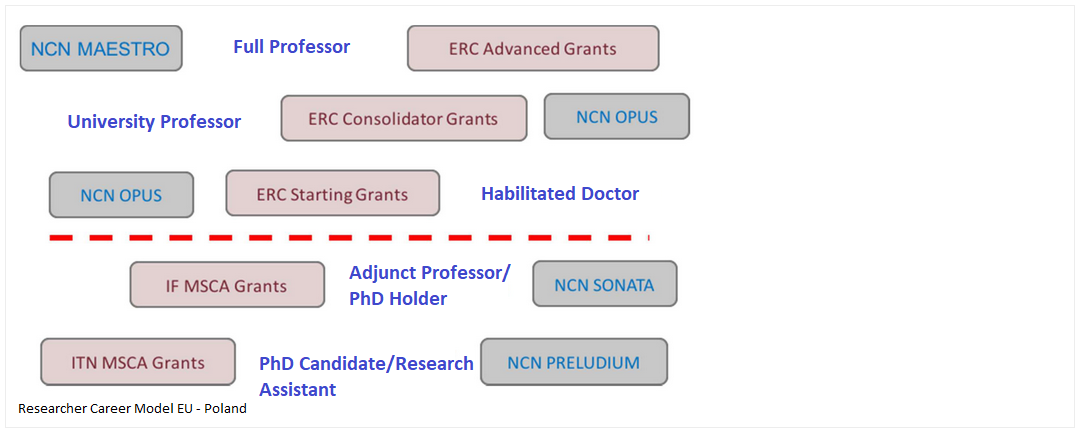Success in the scientific career of PhD students and young PhDs is possible through networking, by Polish universities partaking in international programs dedicated to doctoral students (ITN-MSCA). Networking within scientific disciplines between departments on a national level is a step towards interdisciplinarity.
The PhD student career model may follow an interdisciplinary path (two Polish supervisors or a Polish supervisor and a foreign supervisor).
Creating a doctoral school structure on a national (inter-faculty) network level gives the opportunity to learn from the best teachers, which are not always at one university.
A PhD is the first degree that gives you a pass into adult research life. The solution, therefore, is completing a PhD in partnership with a university and a research institute. In this model, the tutor (supervisor) is an independent university employee, and the assistant tutor (secod supervisor) is an employee of a research institute. Financial resources for a PhD should go to two units: for research at the institute, and for education and administrative services at the university. This model has been implemented for many years around the world (USA), EU (MSCA), and grant agencies in European countries (UK, Germany). In European countries (such as UK, Germany), research institutes do not have the right to give PhD titles. This is due to the fact that they do not have the substantive background to conduct doctoral studies. The situation is similar in our country, because in reality only universities have a substantive background in the field of education.
In a university-research institute partnership model, the first year of the doctoral student is devoted to studying the subject literature and improving research tools. The role of the university and periodic quarterly review reports are important here.
The second year is a continuation of work on using research tools (research institute) and construction of a research plan (university) in the doctoral process.
These two years should be funded by the tutor's or faculty's research project.
The result of this work should be the initiation of a doctoral dissertation and preparation of a research project financed with external funds (eg. NCN, PRELUDIUM). The bibliometric indicators of the supervisor are important here. If the supervisor doesn't have sufficient funds, then the auxiliary supervisor appointed for cooperation should.
Research internships during this period should be of a purely scientific nature and related to the improvement of research tools or the implementation of specific research tasks.
A post-doctoral academic career should lead to independence. In the first period after the PhD (up to 4 years), it is extremely important to complete a postdoctoral fellowship (PostDoc). This allows the enrichment of achievements in another research centre (preferably in a reputable research center in another country), independent of the doctoral supervisor.
It is an important element in assessing the scientific achievements of the applicant in applying for research projects in the field of basic and applied research, both within domestic (NCN, FNP, NCBR) and foreign projects (Horizon: ERC, MSCA).
The above projects constitute the basis for building your own research teams in which doctoral students can (in principle) participate. When creating such projects, the possibility of a partnership between the university and the research institute should be taken into account. Employing PhDs working in research institutes on projects and carrying out research in these institutes should be considered. A certain limitation and, on the other hand, an opportunity for the project manager and / or other PhDs is the role of an assistant supervisor of PhD students. Therefore, independent employees should take part in the projects (they shouldn't be former supervisors of doctoral dissertations). An academic (non-didactic) internship after a PhD is a ticket to acquiring your own projects and proper scientific development in order to obtain a habilitation degree.
An authentic scientific leader (independent employee), both on a national and international arena, should meet the following criteria:
- Publish in reputable journals from the JCR list related to their area of research;
- Publish in international teams, which underlines their credibility and is a genuine confirmation of Publications in national teams providing a confirmation of national recognition;
- Have citations from foreign authors, especially recognizable ones in given research area;
- Document (including publications) coordination of research projects, including international ones;
- Be an expert on national and international level.
Such a scientist carries out his career according to the scheme:

The scientist's activity on an international and national arena will allow for more effective acquisition of research projects and will contribute to implementatingof a long-term scientific policy. In Poland, however, a career is based on the system and related to financial mechanisms (eg NCN - individually, NCBIR - network) and can also be effective so that a young postdoctoral graduate scan reach for the ERC Starting grant.









